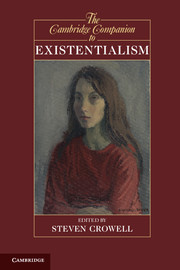Book contents
- Frontmatter
- I Introduction
- II Existentialism in Historical Perspective
- III Major Existentialist Philosophers
- 4 Kierkegaard’s single individual and the point of indirect communication
- 5 “What a monster then is man”: Pascal and Kierkegaard on being a contradictory self and what to do about it
- 6 Nietzsche: after the death of God
- 7 Nietzsche: selfhood, creativity, and philosophy
- 8 Heidegger: the existential analytic of Dasein
- 9 The antinomy of being: Heidegger’s critique of humanism
- 10 Sartre’s existentialism and the nature of consciousness
- 11 Political existentialism: the career of Sartre’s political thought
- 12 Simone de Beauvoir’s existentialism: freedom and ambiguity in the human world
- 13 Merleau-Ponty on body, flesh, and visibility
- IV The Reach of Existential Philosophy
- Bibliography
- Index
- OTHER VOLUMES IN THE SERIES OF CAMBRIDGE COMPANIONS
7 - Nietzsche: selfhood, creativity, and philosophy
from III - Major Existentialist Philosophers
Published online by Cambridge University Press: 28 March 2012
- Frontmatter
- I Introduction
- II Existentialism in Historical Perspective
- III Major Existentialist Philosophers
- 4 Kierkegaard’s single individual and the point of indirect communication
- 5 “What a monster then is man”: Pascal and Kierkegaard on being a contradictory self and what to do about it
- 6 Nietzsche: after the death of God
- 7 Nietzsche: selfhood, creativity, and philosophy
- 8 Heidegger: the existential analytic of Dasein
- 9 The antinomy of being: Heidegger’s critique of humanism
- 10 Sartre’s existentialism and the nature of consciousness
- 11 Political existentialism: the career of Sartre’s political thought
- 12 Simone de Beauvoir’s existentialism: freedom and ambiguity in the human world
- 13 Merleau-Ponty on body, flesh, and visibility
- IV The Reach of Existential Philosophy
- Bibliography
- Index
- OTHER VOLUMES IN THE SERIES OF CAMBRIDGE COMPANIONS
Summary
One of the central themes in existential philosophy is the problem of meaning, a problem that follows upon the modern scientific objectification of nature. Modern science gave priority to mathematics in a mechanical model of motion and causality; accordingly, values and purposes were no longer seen to be intrinsic to nature (as they had been in ancient and medieval thought). If values and purposes were not “objective” and were nevertheless still to find a place in philosophy, they could only be thought in terms of the human “subject.” Yet such a divide created a kind of chasm between the meaningfulness of life and life's natural environment, a chasm that has endured in philosophy ever since. Because human beings exist in nature – which lacks intrinsic meaning – what possible status can be given to meaning-claims about values and purposes? One of the marks of existential philosophy – at least in representative thinkers such as Kierkegaard and Sartre – has been to reverse the priority of scientific, rational objectivity and give precedence to human subjectivity in questions of meaning. In other words, Kierkegaard and Sartre accept the idea of objective being and rational “essences” (as universals that define existing particulars), but they refuse to privilege such notions when it comes to meaning formation, since these notions foster either a nihilistic denial of meaning or an attempt (as in Kant and Hegel) to reconfigure meaning in purely rational terms.
- Type
- Chapter
- Information
- The Cambridge Companion to Existentialism , pp. 137 - 157Publisher: Cambridge University PressPrint publication year: 2012
- 1
- Cited by



